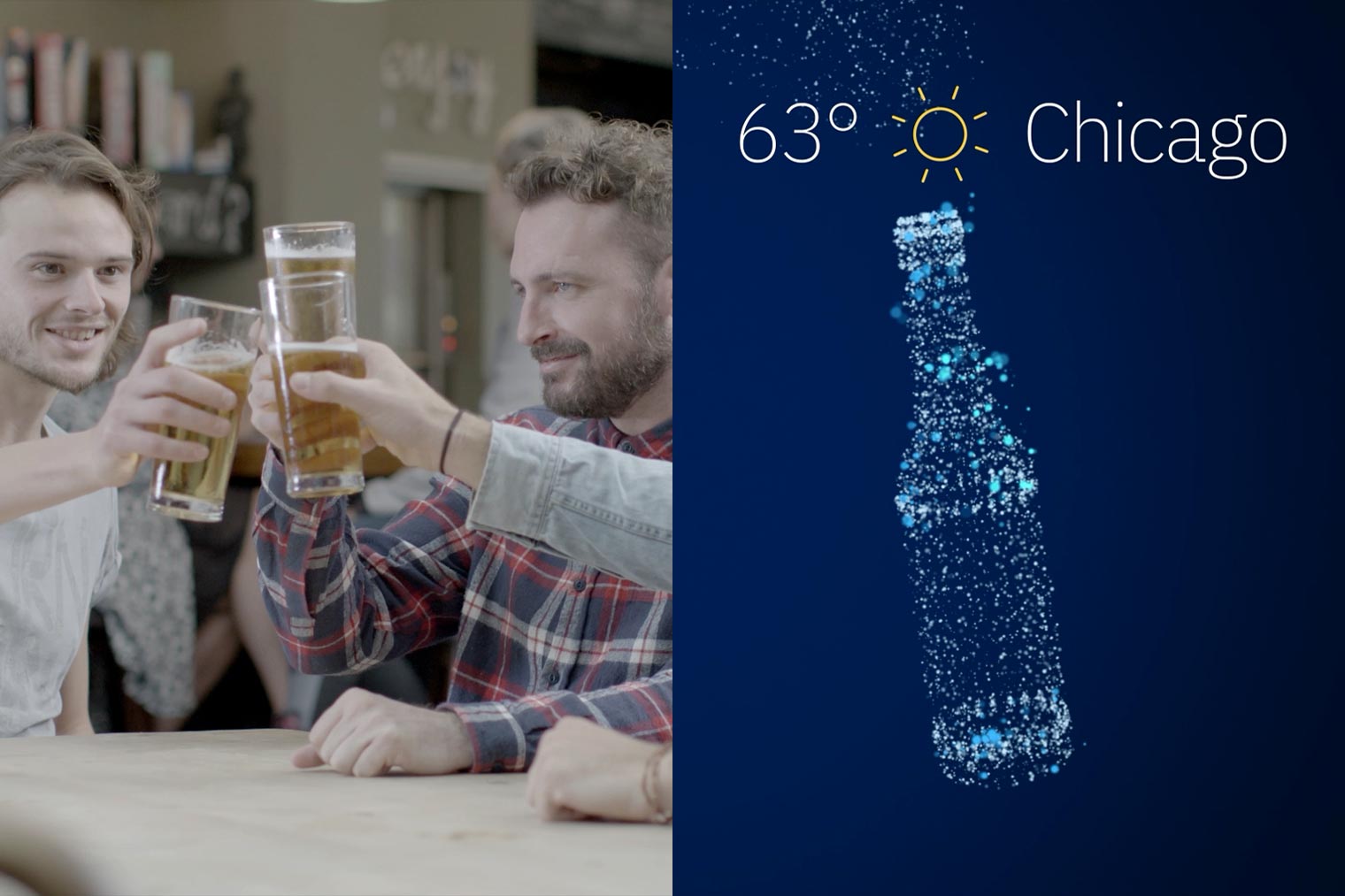Weather intelligence for the future: Crafting a strategic enterprise approach to changing environmental conditions
Continue readingPersonalized advertising, formerly known as interest-based advertising, uses customer insights to increase the relevancy of an ad. Increasing in popularity over recent years, personalized advertising can be a powerful tool to improve the relevance of an ad for users while increasing ROI for advertisers. Ad personalization can provide a better user experience and help brands connect with their target audience.
Insights leveraged for personalized campaigns include a wide range of indicators related to human wants and needs, geolocation, and basic demographic information. This data can also be hyper-specific to your target audience, such as a niche interest or buying intent.
Are personalized ads effective?
Ad personalization is a highly effective form of advertising. 52% of customers expect offers to always be personalized—up from 49% in 2019. Additionally, 66% of customers expect companies to understand their unique needs. However, only 34% of companies are delivering on this expectation.1
The advantages of personalized advertising for consumers are invaluable, including increasing engagement, helping users discover new products, and making online searching faster.
What information can be used to personalize ad experiences?
A number of different data sources can be used to target users and create more personalized ads for them. Below are some of the data sources that are used by companies:
- Contextual signals, such as the content on a page
- Time on page
- Historical data
- Weather forecasting data
- Location data
- Purchase history
- Cookies and browser history
However, there is a push in advertising to ensure that users can control their privacy settings. As a result, tech companies are retiring cookies from their browsers. In order to continue delivering ad personalization, companies must leverage new tactics such as AI advertising.
Privacy and personalization
As noted above, users are concerned about privacy and how their information is being handled. With regulations like the EU’s GDPR evolving and becoming more stringent, brands need to learn how to deliver personalized experiences without being intrusive. Additionally, while there is no unifying law around digital data in the US, individual states such as California have passed regulations to protect users.
Not only are regulators addressing these concerns, but companies such as Google have already begun to phase out cookie targeting. Since Google Chrome accounts for about two-thirds of browser activity, this decision will have a big impact on advertisers.
Solutions such as contextual advertising can help brands create relevant ads based on contextual signals instead of browsing history. Additionally, AI and machine learning can scale ad placements, using algorithms to identify opportunities. As privacy becomes an increasing concern, using new methods to target users will become increasingly important for brands.
What’s the difference between personalized ads and non-personalized ads?
Non-personalized ads are not directly based on a user’s past behavior or interests. Their primary focus is often brand awareness and can include television commercials and billboards. Non-personalized ads often focus on reach rather than a personal message or experience. While an effective strategy to drive awareness, non-personalized ads are difficult to calculate regarding ROI and can lead to wasted dollars.
Personalized ads, on the other hand, use insights to improve the relevancy of ads, such as human wants and needs, geolocation, and basic demographic information. An example of a personalized ad is an ad for rain boots (based on the fact the consumer is in a rainy location), or an ad for running apparel as a consumer reads an article about marathon runners in her city.
The future of personalized ads without cookies
As the advertising industry prepares for a future without cookies and other personally identifiable information (PII), marketers must discover new strategies for reaching their audience. Even with the loss of cookies, AI is still able to recognize patterns in a target audience, without needing to resort to identity-based advertising. With AI, advanced contextual advertising can be achieved by analyzing how a person behaves in a digital space to anticipate their needs and preferences.
In fact, the impending loss of cookies and other PII might be the best change that could happen for modern advertising. After all, cookies and other types of third-party data are often faulty, incomplete and unreliable. Advanced contextual advertising cares less about past choices your customers and prospects have made and more about what matters to them at this very moment. Advertisers can rely on solutions that leverage AI and machine learning to reach the right audience through cookieless targeting.
Creating ads that are fair and unbiased will also be an important component to this shift in advertising. Advertising bias, which is the unintended consequence of programmatic advertising, poses another challenge to advertisers. When employing new technologies, it’s important to understand the adtech being employed and to create a balance of both advantaged and disadvantaged groups. As brands embrace AI, they should be looking to improve their campaigns and mitigate bias that may have crept into past advertising efforts.
The benefits of personalized ads: How can AI help you deliver better creative?
Machine learning is changing how advertisers approach their efforts and creative. There are several benefits in utilizing personalized ads powered by AI, including the following:
1. Effectively target specific audiences
The main benefit of personalized advertising is the capability to reach specific audiences. AI can analyze contextual signals to determine who would be most likely to convert during a campaign or who would be most receptive to a message from your organization.
2. Create more relevant content
Personalized advertising can also help you stand out from the crowd by creating more unique and targeted content that can provide customers with a lasting impression. By delivering content and messaging that is more relevant, you can build customer confidence while leading prospects down the sales funnel.
3. Build deeper relationships with customers
Personalizing your ads can also help build stronger and more personal relationships with your customers. You can show how much you value each customer by sending an email wishing them a happy birthday or by sending a thank you email on the anniversary of joining your email list.
4. Stand out from the competition
Personalized experiences allow your company to stand out from the competition by engaging consumers with more relevant ads. The opportunity is even greater at a time when many companies might not yet have personalized experiences or the bandwidth to create them across channels.
5. Boost sales and conversions
Personalized advertising is not just about connecting with your audience. It’s also a great way to help your customers and grow your sales. A simple recommendation or a suggestion has the potential to bring in a qualified lead that turns into a long-time customer.
Personalized experiences can help you drive better results
At The Weather Company we understand the benefits of personalized advertising and have designed AI-powered solutions that help you stand out from the competition and drive ROI.
- Weather Targeting and weather-based advertising: Weather Targeting combines the power of weather’s ability to drive emotion and action with AI capabilities to model and train algorithms.
For example, a forecast of 50 degrees in one city may not cause the same behavior in another. Rather than relying solely on temperature or other basic factors, each Weather Targeting trigger uses machine learning to improve resonance by recognizing what the weather “feels like” and how consumers in that specific area are likely to react.
- Conversational marketing: Conversations is an interactive solution that helps facilitate personalized AI conversations with consumers virtually anywhere online.
Powered by AI, this turnkey solution is designed to deliver more engaging and memorable ad experiences by using artificial intelligence to understand the user’s intent and provide answers, recommendations or next steps. This helps assure that every interaction your consumer has is unique and effective while giving you valuable consumer insights.
Personalization examples
Toyota uses conversational marketing to engage a tech-savvy audience
Toyota came to The Weather Company to launch an automotive advertising campaign with the goal of engaging auto-intenders in today’s environmentally conscious world. Their Prius Prime vehicle is more technologically advanced than the average car. For that reason, Conversations technology solution provided an exceptional way to engage and educate this tech-savvy audience.
Toyota Prius was able to have real-time conversations with clients and prospects. This interaction was a new way for users to engage with the brand, leading to the following results2:
- 6,000 total User Conversations
- 3x Google Rich Media interaction-time benchmark
- 20 percent increase in Purchase Consideration among M35-49
- 37 percent higher engagement with audience-based location targeting than other audience-based campaign targeting used
- 3 interactions per Session for Big Web
Final thoughts
At The Weather Company we are dedicated to providing cutting-edge solutions that enable users to create personalized experiences for customers. Powered by AI and designed to solve the marketing challenges of today without the use of cookies, personalized advertising can help to better target specific audiences, build deeper relationships, and boost sales and conversions.
Ready to learn more about the benefits of personalized advertising? Contact us today.
Frequently asked questions
Let’s talk
What’s your weather strategy? To learn more about increasing campaign efficiencies and personalizing messages at the most relevant moments, contact our advertising experts today.
Contact us






